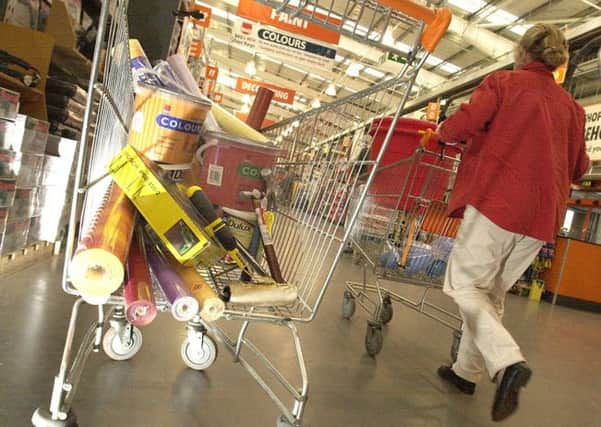How Britons just can’t or won’t DIY like their dads


The findings also coincide with what is traditionally one of the most popular periods for DIY – the long Easter holiday weekend.
The survey found half of those questioned would not feel confident enough to wallpaper a room, and four in ten would baulk at putting up a shelf.
Advertisement
Hide AdAdvertisement
Hide AdOne in seven said they would also have problems with assembling flat-pack furniture.
Even basic DIY skills, like changing a plug, presented difficulties for one in four people and nearly one in ten said they possessed no DIY tools at all.
The YouGov survey taken last week of 1,900 people comes days after Kingfisher announced the closure of 60 of its B&Q stores – one in six – over the next two years, including its last in Dundee.
Homebase DIY has already said 80 of its stores, one in four, - will shut by 2019.
The Automobile Association, Britain’s largest motoring group, also reported a standstill in interest in visiting DIY stores this weekend. Its own poll showed just 11 per cent were planning a trip, the same as last year, compared to 17 per cent visiting garden centres.
However, Kingfisher disputed the demise of DIY. Chief executive Véronique Laury said: “It is not a problem of generations. They probably have less knowledge than their parents, but they have the willingness to learn.
“You can look at things in two ways – they don’t know how to do it, so we can leave them with little knowledge, or we do something about it.
“Where we stand as Kingfisher is with them, to help them to improve their home or get them the help they need.”
Advertisement
Hide AdAdvertisement
Hide AdThe RatedPeople website, where homeowners can seek quotes for DIY tasks from tradespeople, said its surge in traffic showed many people no longer had the time or skills to do such jobs themselves.
But Jen Gales, founder of the makedoandmend-able.co.uk website, said while young people may have fewer basic skills than previous generations, the increasing popularity of crafts could help reverse the trend.
She said: “As a general rule, DIY is probably less popular than it was 20 years ago, but there is still a core of people out there tinkering and hacking and having a go. I think the will is there, but maybe we’re all not sure who to turn to, to learn these skills. I also think some people assume it will be more expensive to fix something than it would be to buy it new.
“My hope is the rise in popularity of crafts, and sewing, due to shows like the Sewing Bee, is a precursor to us all becoming more hands-on in all areas of our lives, and that this apparent drop in the popularity of DIY will be temporary.
“But when it comes back, it will be different. It will be more collaborative, and there will be more skill-sharing, and tool- sharing, and DIY will be reinvented for a new generation.”
Chris Hellawell, founder of the Edinburgh Tool Library, which loans equipment to DIY-ers, said: “The DIY industry may be in decline, but it will never die. The way in which the industry works is changing though.
“It’s not about men in the garage or the shed any more, it’s about both men and women, who want to create something themselves.
“DIY is no longer about necessity, but more about the pleasure and pride someone gets from the creation of something new - a transition from fixer to maker.
Advertisement
Hide AdAdvertisement
Hide Ad“It has been suggested it could be connected to the change in gender roles of men. I would disagree with this, because for every man that feels comfortable to leave DIY to someone else, there is a woman who wants to do it herself.
“Currently about 35 per cent of our members are female, and it is a conscious effort at the tool library to be gender neutral, and encourage people who previously hadn’t used tools, to try.”
Chris Hellawell, founder of the Edinburgh Tool Library, which loans equipment to DIY-ers, said: “The DIY industry may be in decline, but it will never die. The way in which the industry works is changing though.
“It’s not about men in the garage or the shed any more, it’s about both men and women, who want to create something themselves.
“DIY is no longer about necessity, but more about the pleasure and pride someone gets from the creation of something new - a transition from fixer to maker.
“It has been suggested it could be connected to the change in gender roles of men. I would disagree with this, because for every man that feels comfortable to leave DIY to someone else, there is a woman who wants to do it herself.
“Currently about 35 per cent of our members are female, and it is a conscious effort at the tool library to be gender neutral, and encourage people who previously hadn’t used tools, to try.”
FOLLOW US
SCOTSMAN TABLET AND MOBILE APPS